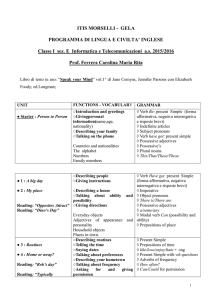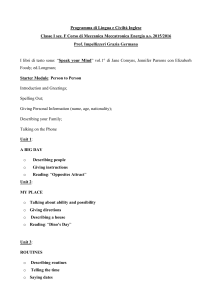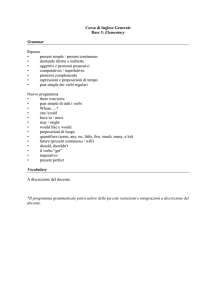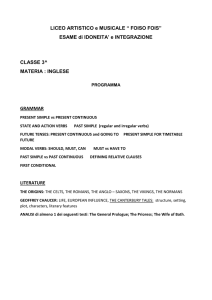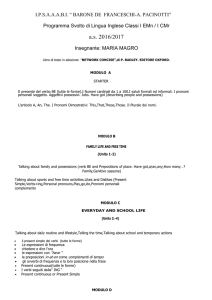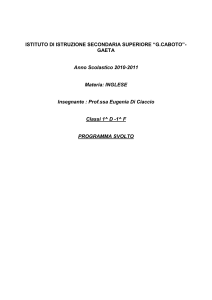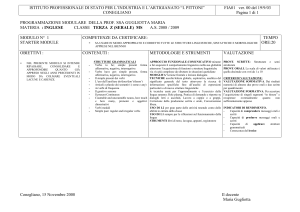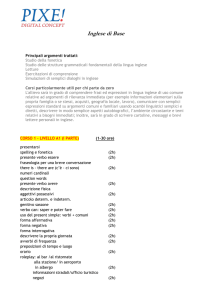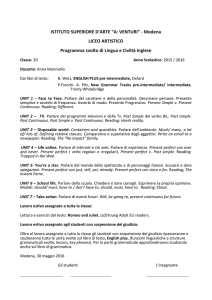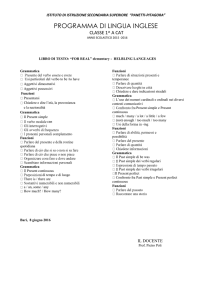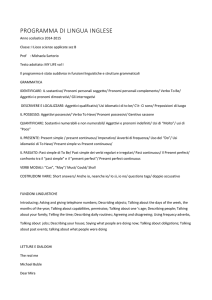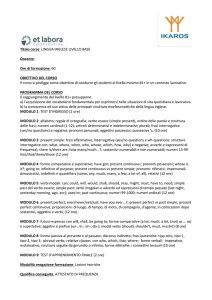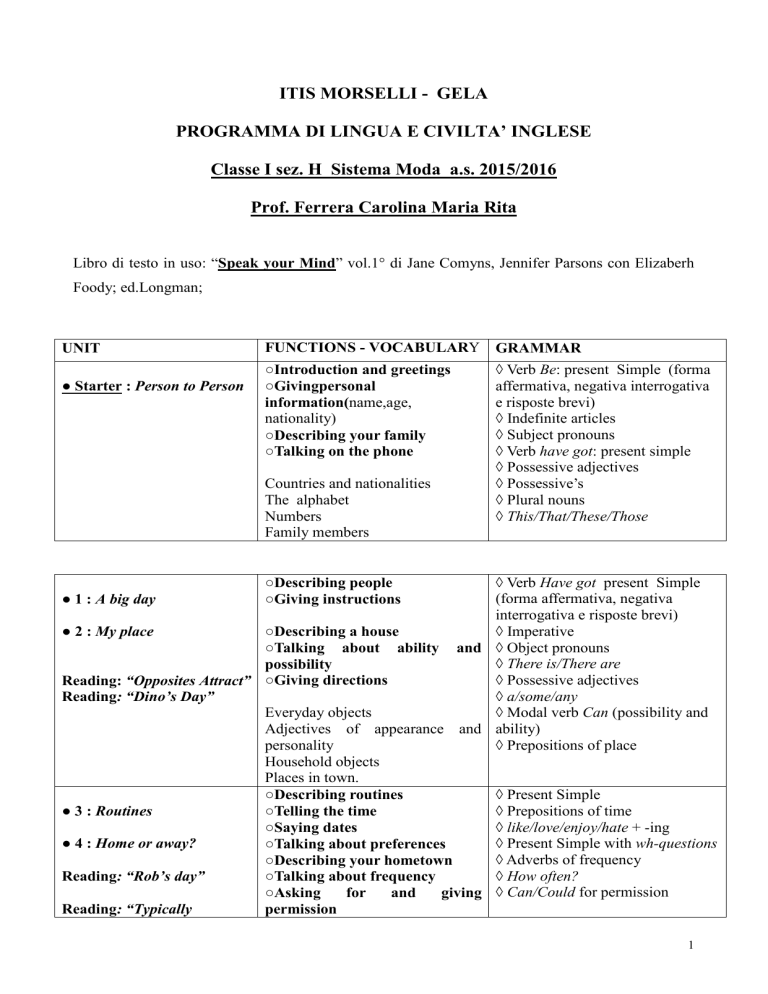
ITIS MORSELLI - GELA
PROGRAMMA DI LINGUA E CIVILTA’ INGLESE
Classe I sez. H Sistema Moda a.s. 2015/2016
Prof. Ferrera Carolina Maria Rita
Libro di testo in uso: “Speak your Mind” vol.1° di Jane Comyns, Jennifer Parsons con Elizaberh
Foody; ed.Longman;
UNIT
● Starter : Person to Person
FUNCTIONS - VOCABULARY
GRAMMAR
○Introduction and greetings
○Givingpersonal
information(name,age,
nationality)
○Describing your family
○Talking on the phone
◊ Verb Be: present Simple (forma
affermativa, negativa interrogativa
e risposte brevi)
◊ Indefinite articles
◊ Subject pronouns
◊ Verb have got: present simple
◊ Possessive adjectives
◊ Possessive’s
◊ Plural nouns
◊ This/That/These/Those
Countries and nationalities
The alphabet
Numbers
Family members
◊ Verb Have got present Simple
(forma affermativa, negativa
interrogativa e risposte brevi)
● 2 : My place
◊ Imperative
○Describing a house
○Talking about ability and ◊ Object pronouns
◊ There is/There are
possibility
◊ Possessive adjectives
Reading: “Opposites Attract” ○Giving directions
◊ a/some/any
Reading: “Dino’s Day”
Everyday objects
◊ Modal verb Can (possibility and
Adjectives of appearance and ability)
personality
◊ Prepositions of place
Household objects
Places in town.
○Describing routines
◊ Present Simple
◊ Prepositions of time
● 3 : Routines
○Telling the time
◊ like/love/enjoy/hate + -ing
○Saying dates
● 4 : Home or away?
◊ Present Simple with wh-questions
○Talking about preferences
◊ Adverbs of frequency
○Describing your hometown
◊ How often?
○Talking about frequency
Reading: “Rob’s day”
○Asking
for
and
giving ◊ Can/Could for permission
permission
Reading: “Typically
● 1 : A big day
○Describing people
○Giving instructions
1
English”
Reading: “Under the
weather”
○Talking about the weather
Time, dates, days of week, months
Ordinal numbers
The weather and seasons
Emotions
UNIT
FUNCTIONS - VOCABULARY
GRAMMAR
● 5 : Eat up!
○Talking about quantities
○Talking about prices
○Buying food and drink
◊ Countable and uncountable nouns
with some/any/no
◊ How much/many; a lot of; a
little/a few; not many/much
◊ Would like(offers, requests)
◊ Present continuous
◊ Present simple vs Present
continuous
◊ too/ (not) enough
● 6 : What are they doing?
Reading: “Good food, bad
food?”
Reading: “How to be smart
in the shops”
○Describing what people are
doing
○Asking for information
○Offering help
○Checking information
Food and drink
Containers and prices
Clothes
Phrasal verbs - clothes
● 7 : I remember…
Reading: “I remember”
○Talking about ability in the
past
○Talking about the past
○Giving and receiving news
◊ Past simple – to be and can
◊ Past simple affirmative (regular
and irregular verbs)
Personality adjectives
School and school subjects
■Laboratory Activities:
Listening Comprehension;
Grammar Activities
How to Write a Summary
How to Make an Oral Report
■Strutture grammaticali:
il present simple del verbo to be, forme affermativa, negativa, interrogativa e risposte brevi;
gli aggettivi possessivi;
il possessive case dei sostantivi;
2
pronomi personali soggetto e oggetto
pronomi dimostrativi;
il plurale dei sostantivi;
preposizioni di tempo e di luogo;
verbo can
present simple del verbo to have, forme affermativa, interrogativa, negativa e risposte brevi;
avverbi di frequenza;
present simple dei verbi ordinari;
present continuous;
present simple vs present continuous;
countable and uncountable nouns;
quantifiers;
wh-words;
can/could;
would like;
imperatives
past simple (to be)
past simple (regular and irregular verbs)
■Funzioni linguistiche:
Salutare e presentare se stessi ed altre persone;
Chiedere e dare informazioni personali e parlare di se stessi;
Chiedere e dare informazioni sui prezzi;
Parlare di professioni;
Parlare di orari, chiedere e dire l’ora;
Chiedere e dare indicazioni sui luoghi;
Parlare dei propri passatempi;
Parlare della vita quotidiana;
Parlare delle proprie preferenze;
Usare espressioni quotidiane in conversazioni
Parlare di attività in corso di svolgimento
Parlare di eventi passati.
3
■Lessico e pronuncia:
Phonetic Symbols
Paesi e nazionalità;
Oggetti di uso quotidiano;
Parentela;
I contrari;
Cibi e bevande;
I verbi di azione;
Professioni;
Tempo libero e passatempi;
Money;
Shopping;
Music;
Individuazione della sillaba su cui cade l’accento;
Pronunciation
Approfondimenti:
■Culture Frame 1: Budget London
■Culture Frame 2: Food Fights
Gela, 31/05/2016
Gli Alunni
La Prof. Ferrera Carolina Maria Rita
_________________
_________________
_________________
4

